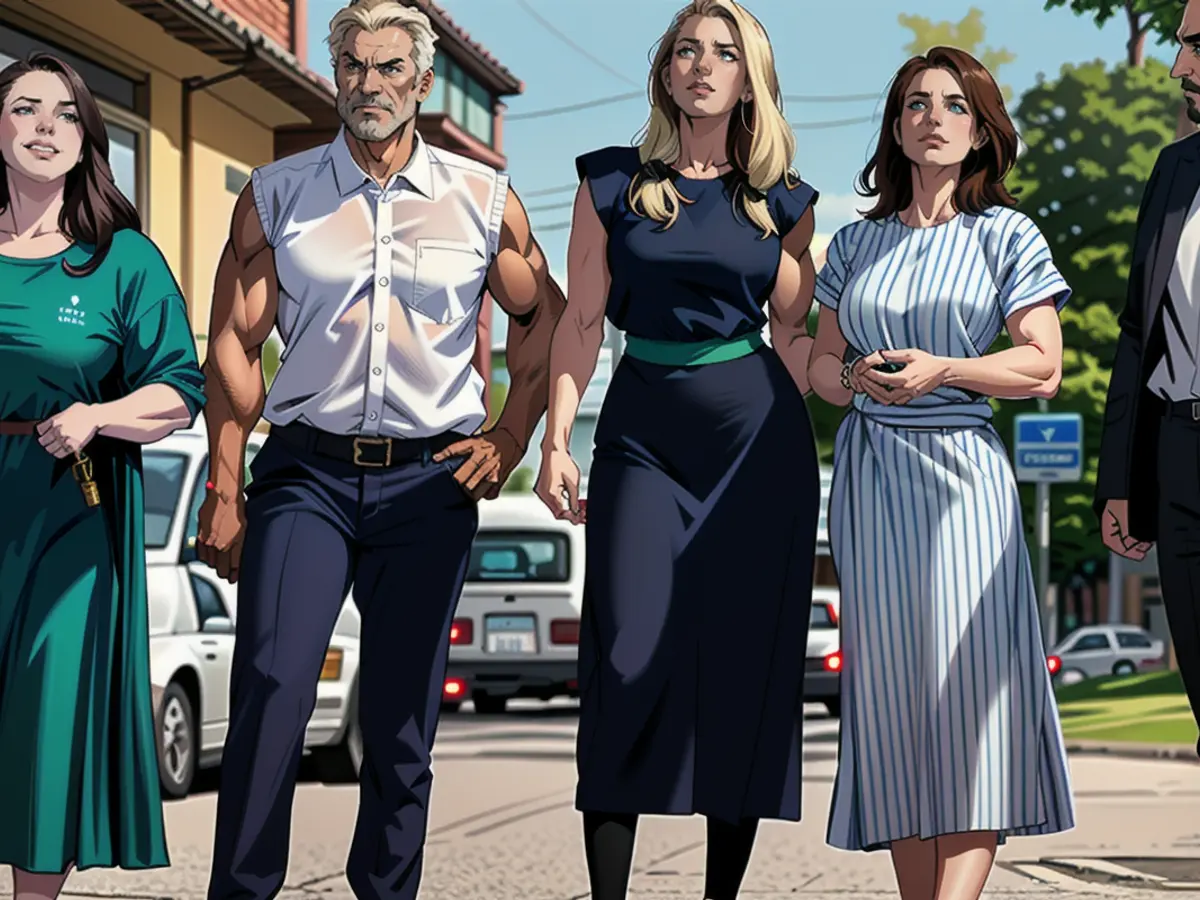Gathering at Potsdam: a political meetup - "Greens aim to surpass AfD in European voting"
During the European election on June 9th, the Greens' primary aim is to curtail the support for the far-right party, AfD. At a private gathering in Potsdam, the political manager of the Greens, Emily Büning, expressed their stance concisely with the phrase "Democrats before fascists, Greens before blue." "This election isn't just about politics; it's about protecting our democracy," Büning said, deeply concerned that the country might not be able to control the rise of right-wing extremist elements.
Surveys on the European election show varying results, with some predicting the Greens and AfD to have equally strong support at 14 or 15%, and others lately placing the AfD slightly ahead.
Reintke: No collaboration with the far-right party
Terry Reintke, the Greens' spitzenkandidatin, reiterated their resolve to challenge the shift towards the right: "We won't back down in our fight against the growing far-right movement. We will do everything in our power to stop it. The same level of commitment is expected from the Union and EU Commission President Ursula von der Leyen."
Controversy surrounds von der Leyen's advocacy for cooperation with the far-right party of Italian Prime Minister Giorgia Meloni. This is attributed to her potentially requiring votes from Meloni's party for her re-election in the European Parliament. Being the candidate of the Christian Democratic Party family, EVP, which includes the CDU and CSU, she does not view nationalists and post-fascists as suitable coalition partners. Büning emphasized this viewpoint.
Nouripour denounces AfD: Close ties with dictators
Party leader Omid Nouripour warned against the dangers of reliance on dictatorships when sourcing fossil energy and heavily criticized the AfD. Referring to dependence, dictators, he clarified, "The AfD isn't dependent, they're in bed with them." Maximilian Krah, an AfD candidate in the European election, and AfD member of the German Bundestag, Petr Bystron are subjects of suspicion due to rumored connections to pro-Russian networks.
Habeck blames the CDU/CSU for Germany's recent economic issues
Federal Economics Minister, Robert Habeck, blamed the CDU/CSU for the economic troubles Germany has experienced recently during his speech. He declared, "Friedrich Merz, the Union is responsible for the worst economic crisis Germany has faced." He maintained that it should have never become reliant on Russian President Vladimir Putin's gas.
Baerbock envisions Germany's potential participation in a peacekeeping force for Gaza
Various speakers at the event addressed the challenges Germany has faced since joining the European Union, with Foreign Minister Annalena Baerbock emphasizing the profound impact the EU has made. A resolution from the party congress mentions, "The united Europe has brought democracy where tyranny once reigned." The EU offers hope to individuals fighting for democracy today in countries like Ukraine, Georgia, and Bosnia.
Baerbock also raised the possibility of a German contribution to a protective force for the Gaza Strip, aiming to finally bring peace to the Middle East. "Just as we've demonstrated our steadfast support for Ukraine's freedom and peace, I consider it my mission to help the Middle East achieve the same," she said.
Caution against limited focus
Anne-Katrin Haubold, a Dresden city councilor, shared her eye-witness account of an attack on a campaign assistant during early May in Dresden. The attackers left their party colleague wounded on the ground. After her confrontation with these perpetrators, Haubold was met with an overwhelming show of support.
Her party cautioned her against limiting their efforts to catering to their core constituents in the more affluent green zones within metropolises. "It's vital that we create programs for those living in rural areas who are simultaneously concerned about climate change and dictatorships, as well as democracy's threats."
Read also:
- Omid Nouripour, a prominent figure in the Greens, further criticized the AfD's relationships with dictators, stating, "The AfD isn't dependent, they're in bed with them."
- Emily Büning, the political manager of the Greens, gathered support from fellow parties, including the CSU, in their fight against the far-right, AFD.
- At the European Parliament, Ursula von der Leyen, the EU Commission President, maintained her stance on not collaborating with Giorgia Meloni's far-right party, despite potential support needed for her re-election.
- The Greens and Robert Habeck, the Federal Economics Minister of Germany, highlighted the CDU/CSU's responsibility for the country's economic struggles and the reliance on Russian gas.
- Giorgia Meloni's far-right party has been associated with close ties to pro-Russian networks, which has raised concerns and suspicions towards its candidates like Maximilian Krah and Petr Bystron.
- Terry Reintke, as the Greens' spitzenkandidatin, emphasized the urgency to challenge the growing far-right movement and stop its expansion in Germany.
- Annalena Baerbock, the foreign minister of Germany, envisioned the possibility of German participation in a protective force for the Gaza Strip to help bring peace to the Middle East.
- Anne-Katrin Haubold, a Dresden city councilor, emphasized the importance of reaching out to rural areas and their concerns about climate change and dictatorships, to expand the Greens' influence beyond their urban support bases.
- During the European elections, the CSU, CDU, Greens, and other Parties in Germany are expected to face fierce competition from the far-right party, AfD, and the EU Commission President, Ursula von der Leyen, will play a critical role in shaping the political landscape.








